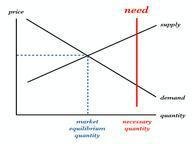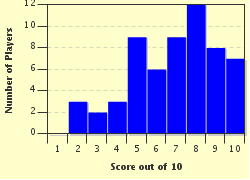Quiz Answer Key and Fun Facts
1. Veblen goods are products that experience an increase in their demand when their price increases. Of the following, which product is more likely to act as a Veblen good?
2. Sociologist and Economist Thorstein Veblen also coined what two-word term to describe behavior that causes people to acquire expensive objects not for their utility but as a display of their relative wealth?
3. Ok, imagine an area with either wealthy people or poor people and they have only two products to eat: very costly beef and low cost bread. Stay with me, it could happen. The price of bread rises. The price of beef stays the same. Using an economic theory called a "Giffen Good" what do you expect to happen to the demand for bread?
4. What is the economic theory that combines an explanation for the continuing importance of London as a finance center (despite the diminished number of locally owned banks) and the futility of British tennis players in the oldest "Grand Slam" tennis tournament?
5. The Malthusian Trap sounds more like a science fiction horror movie than an economic theory. The Malthusian Trap suggests that societal improvements in technology do not produce increases in individual income because people are also increasing what off-setting factor?
6. What is the name of the economic theory that states the best way to improve the income of the poor is to cut taxes on the rich?
7. Call me Dr. Obvious, but people who work usually want to earn more money rather than less money. Not surprisingly, as salaries increase more people want to work thus increasing the labor supply. However, when wages get too high, an odd phenomenon can occur where the supply of labor starts to decrease. What are the laborers doing instead of working more hours and thereby earning even more money?
8. Imagine a group of people are offered the choice of an all-expenses paid trip to London or Madrid. Which would they choose? Now imagine a third option is added to go to Madrid but without paid meals or lodging. After the third choice is presented, more people choose Madrid (fully paid) over London. What is the hunting related name for this economic phenomenon?
9. According to the Khazzoom-Brookes Postulate (say that five times fast) what seemingly illogical effect does increased energy efficiency have on energy consumption?
10. Economics and morality are two concepts that are rarely seen together. What seemingly ethics-related term is used to describe the situation where one party makes highly risky decisions because another party will bear the economic cost of any failure?
Source: Author
adam36
This quiz was reviewed by FunTrivia editor
stedman before going online.
Any errors found in FunTrivia content are routinely corrected through our feedback system.

